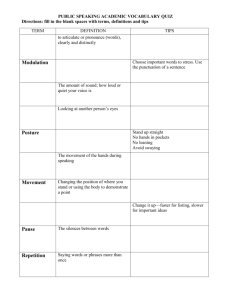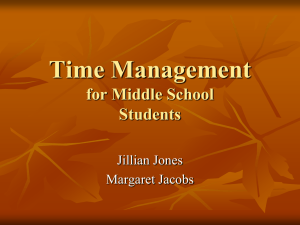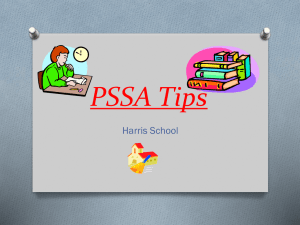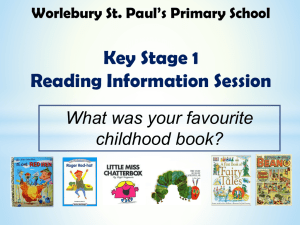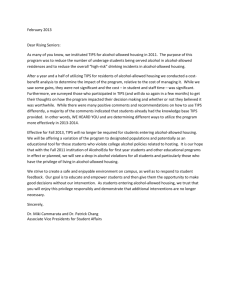BREAKTHROUGH CAMBRIDGE LESSON
advertisement
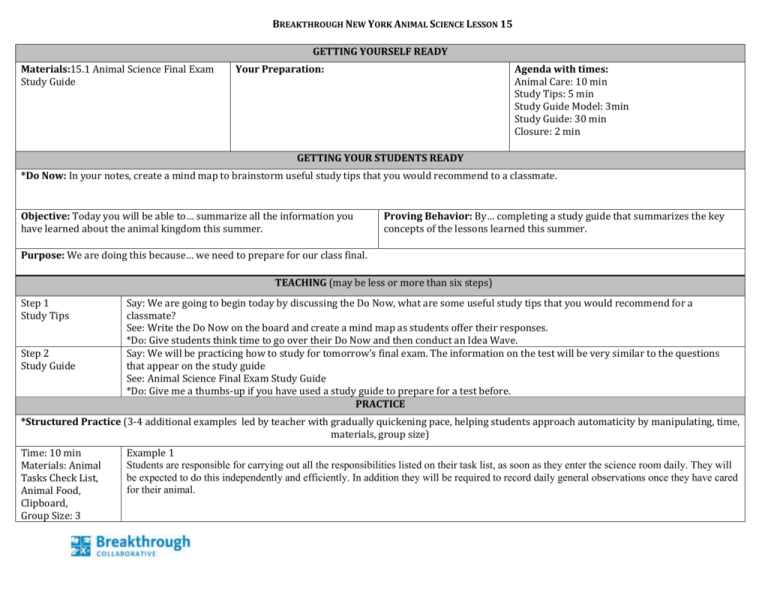
BREAKTHROUGH NEW YORK ANIMAL SCIENCE LESSON 15 GETTING YOURSELF READY Materials:15.1 Animal Science Final Exam Study Guide Your Preparation: Agenda with times: Animal Care: 10 min Study Tips: 5 min Study Guide Model: 3min Study Guide: 30 min Closure: 2 min GETTING YOUR STUDENTS READY *Do Now: In your notes, create a mind map to brainstorm useful study tips that you would recommend to a classmate. Objective: Today you will be able to… summarize all the information you have learned about the animal kingdom this summer. Proving Behavior: By… completing a study guide that summarizes the key concepts of the lessons learned this summer. Purpose: We are doing this because… we need to prepare for our class final. TEACHING (may be less or more than six steps) Step 1 Study Tips Step 2 Study Guide Say: We are going to begin today by discussing the Do Now, what are some useful study tips that you would recommend for a classmate? See: Write the Do Now on the board and create a mind map as students offer their responses. *Do: Give students think time to go over their Do Now and then conduct an Idea Wave. Say: We will be practicing how to study for tomorrow’s final exam. The information on the test will be very similar to the questions that appear on the study guide See: Animal Science Final Exam Study Guide *Do: Give me a thumbs-up if you have used a study guide to prepare for a test before. PRACTICE *Structured Practice (3-4 additional examples led by teacher with gradually quickening pace, helping students approach automaticity by manipulating, time, materials, group size) Time: 10 min Materials: Animal Tasks Check List, Animal Food, Clipboard, Group Size: 3 Example 1 Students are responsible for carrying out all the responsibilities listed on their task list, as soon as they enter the science room daily. They will be expected to do this independently and efficiently. In addition they will be required to record daily general observations once they have cared for their animal. Time: 3 min Materials: Study Guide Group Size: Class Model the following for the students using the first two questions on the study guide: 1. List the order in which the Linnaeus Classification System organizes life: “I know the answer to this question; I am going to check my notes to verify my answer. Yes, according to my notes I was correct. I am going to put a check next to the question to indicate that I know this information.” 2. Describe the difference between a vertebrate and non-vertebrate animal. Say: “I forgot what the difference is. Let me refer to my notes. I am going to draw a picture next to this question to help me remember. I am also going to put a star next to the question because I still need to review it. “ *Guided Practice (the proving behavior of the objective monitored by teacher) Assignment: Complete study guide independently. You may use a lifeline if you need one, such as – notes, a peer or a teacher. Criteria for Mastery: Explain Homework: Focus your studies on the questions you have starred on your study guide. If you know the information on the sheet you will be prepared. Practice memorizing the information with a study partner. *Closure: Fist-to-Five Poll: How confident are you about your preparedness for tomorrow’s final. What questions do you have for me that still need clarifying? *Active Participation is required by all students at the same time.

